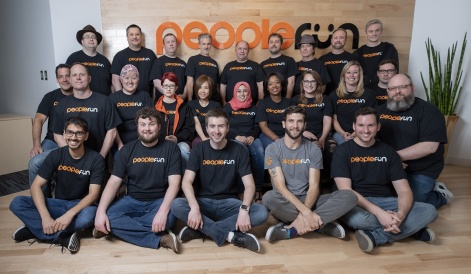The games industry plays host to a colourful cast of diverse individuals, from artists and coders to narrative designers and studio heads.
The skills to pull off these roles, however, are complex and differing, with each position requiring mastery in its field.
To highlight some of the brilliant work that goes on behind the screen, and help others who may be keen to dive in, PocketGamer.biz is reaching out to the individuals who make up the games industry with our Jobs in Games series.
This week we spoke with Wordscapes developer PeopleFun director of user research Matt Streit.
PocketGamer.biz: Can you tell us about your current role and what it entails?
Matt Streit: I am the director of user research at PeopleFun, where I work very closely with product management and analytics to make sure that we incorporate all the data possible into a holistic view of the experience we’ve created for our players.
I am also building a team of user researchers so that we can deliver the best experiences possible.
How did you first get into games and how did you progress into this role?
I started as a vendor at Microsoft where I spent a couple of years learning the ins and outs of the core research methods used at the time.
I then joined THQ where I was able to work on some really exciting IP like Saints Row, Dawn of War, Darksiders, and the Warhammer 40,000 MMO.
I was able to work on some really exciting IP like Saints Row, Dawn of War, Darksiders, and the Warhammer 40,000 MMO.
Matt Streit
After THQ, I spent some time teaching a variety of courses focusing on game design, interdisciplinary game development, game production and user research at Southern Methodist University’s Guildhall. I then worked at Activision and transitioned into the mobile space with Scopely, where I had an opportunity to build the user research function.
Throughout it all, I’ve really enjoyed the process of building games, teams, and a player-focused culture – so the opportunity to join PeopleFun and really build a team from the ground up was quite exciting.
Is it something you ever imagined yourself doing?
I had previously toyed with game development in high school and undergrad but I hadn’t seen a path into games for myself.
I wasn’t aware that user research in games existed until I was halfway through graduate school. One of our alumni came back to give a talk on the work he had been doing on Halo and it was like a lightbulb went off.
Knowing that games are about delivering an experience and psychology is about measuring the experiential, it made a lot of sense that you’d find them in games.
Of course, psychologists work in many different industries but to have psychologists working in games wasn’t something I considered prior to that talk. I actually reached out to that alumni on my 10-year anniversary of entering games to thank him again and let him know how important that presentation had been in my life.
What did you study (if anything) to get your role? What courses would you advise for aspiring professionals in the area?
As an undergrad, I studied computer science and psychology before getting my PhD in psychology. If you’re looking to get into user research, I strongly recommend taking courses related to human-subjects research (example: psychology, sociology, anthropology, etcetera.) and dabbling in other subjects related to making games or data science.
They didn’t have game design programs back then, but it would be very helpful for someone coming into the industry.
What part of your role do you find most fulfilling?
User researchers at PeopleFun are very well integrated with both the development and analytics teams. That empowers us to have the most insightful findings possible while ensuring that they result in tangible changes to our products.
Tell us about what the gaming scene in Dallas is like?
Dallas is a growing city and it has been exciting how much growth has taken place in the last few years.
Dallas is a growing city and it has been exciting how much growth has taken place in the last few years.
Matt Streit
There is an immense amount of talent with a great mix of experience levels – giving you the opportunity to learn from people who have been working in games for decades.
What do you think are the biggest advantages and disadvantages of your role?
One of the advantages of being in user research is that you’re one of the closest to your players and you get to see and hear about the impact your games have on people’s lives pretty regularly. It makes an already fulfilling career in making games even more so.
However, one disadvantage is that as a “softer” science with more qualitative data, it can be more challenging to get buy-in than the groups who have “hard” quantitative data but user research is a superpower for an organization that embraces it.
Do you think there are any misconceptions, public or professional, surrounding your area of expertise?
I think psychology, in general, gets misunderstood a lot. There’s a lot more to it than therapy. It’s really a science and taking what we understand about the human mind and applying it to making the best experiences possible.
What advice do you have for someone looking for a job in this profession?
Take multi-disciplinary courses so you have both a breadth of knowledge and know how to apply it. Join an online community, such as the IGDA Games User Research and Experience where there are a lot of resources and a mentoring program.

Read up on the core methods – usability testing and playtesting – and try conducting some tests of your own that you can show to prospective employers.
How has remote working impacted the role (if at all)?
We haven’t been able to bring players into a lab and get feedback from them that way, but there are online tools available such as PlaytestCloud that have helped fill in a lot of that gap.
Since we’re in mobile games, luckily we just require someone to have a phone to test a game, so it’s been a bit easier for us to adapt to a new way of working.
Is there anything about the job/industry you wish you would have known when first joining?
There’s a very big cultural difference between places that are run by production, product management or design. Understanding some of those differences, as well as how you like to work, can be very important in figuring out where you’ll be most successful.
Finally, what other advice do you have for someone looking for a job in this profession?
Try not to get discouraged if you can’t find a job right away. The user research field in games is very small – there are probably only a few hundred of us globally – and getting your foot in the door can be a challenge.
We’re a pretty welcoming group, though, so drop into the Discord to make some connections and attend the summits if you can.
Keep taking steps that better position you the next time a job opens such as taking more classes, running tests on your own, or getting a user research job in another field and then moving into games.

